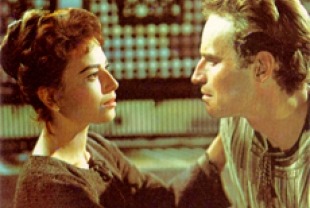Ben-Hur won 11 Academy Awards including Best Picture after its release in 1959. William Wyler directed this mammoth production with 350 speaking parts and over 50,000 extras. The long-awaited DVD contains the following special features: commentary by Charlton Heston; the new digitally remastered picture and final soundtrack; screen tests of the cast; the addition of the seldom-heard Overture and Entr'acte music by Miklos Rozsa; a behind-the-scenes documentary, Ben-Hur: The Making of an Epic; the original theatrical trailer; and an on-the-set-photo gallery featuring Wyler, producer Sam Zimbalist, cameraman Robert Surtees, and others.
The drama is framed by events in the life of Christ beginning with his birth in a stable where the three kings present their gifts and ending with a miraculous healing following the crucifixion. The central theme of Ben-Hur is forgiveness. Henri J. M. Nouwen has written: "The only people we can really change are ourselves. Forgiving others is first and foremost to healing our hearts." Yes, but what a long process and what a painful journey this can be when a vengeful heart has turned to stone!
Ben-Hur (Charleton Heston) is a wealthy prince in Jerusalem when his childhood friend Messala (Stephen Boyd) returns as second-in-command with the Roman army in Palestine. This ambitious young man is a zealous believer in the Emperor and wants to make an impression upon him by restoring law and order to the country. When Ben-Hur refuses to give him the names of Jews opposed to Roman rule, Messala cuts him off.
When an accident occurs during the welcome parade for the new governor, Messala blames it on Ben-Hur and sends him off into slavery. His mother (Martha Scott) and sister (Cathy O'Donnell) are imprisoned in a dungeon. And his loyal steward is beaten while his daughter, Esther (Haya Harareet), vows to await her master's return.
On a march through the desert, Ben-Hur and the other slaves reach Nazareth. There a kindly and compassionate man gives the dehydrated Jewish prince a cup of water that revitalizes his body and restores his soul. But during his three years as an oarsman on Roman ships, Ben-Hur's vow of revenge is all that keeps him alive. After rescuing the captain (Jack Hawkins) of the ship, Ben-Hur is taken to Rome where he excels as a chariot racer. His benefactor adopts him as his son, but the outsider decides to return to Jerusalem where he is reunited with Esther. Ben-Hur and Messala square off against each other in a grueling chariot race before the Jewish people in games hosted by Pontius Pilate. Afterwards, he returns the courtesy of Jesus of Nazareth by offering him a cup of water as he is carrying the cross to Golgotha.
Ben-Hur is famous for its spectacles but it is most inspiring in its little moments. The indirect treatment of Jesus is quite effective — we never see his face. Perhaps the most convincing scene is when we look over Jesus' shoulder to the expression on the face of a Roman soldier at the well in Nazareth — the man just backs away from his awesome personal presence. Near the end of the film, Jesus' path of forgiveness provides a powerful allure to Esther and others. And Ben-Hur's hardened heart begins to thaw.
